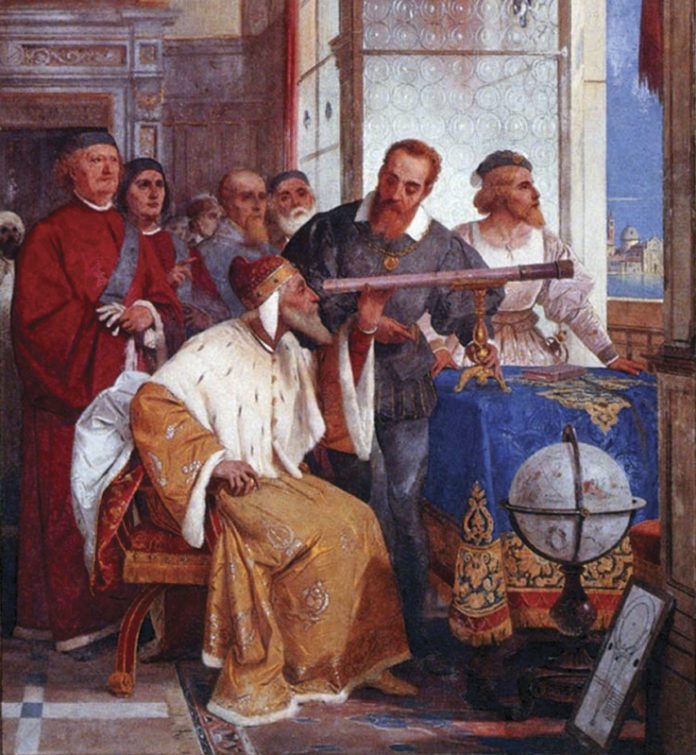By Gordon Tomb
Is the modern scientific establishment like the 17th-century elite who conspired against Galileo for his heliocentric “apostasy” — both being motivated by a desire to retain power and privilege rather than by a search for truth? That’s what best-selling author Eric Metaxas suggests in his recent book, “Is Atheism Dead?”
Metaxas explains how Galileo’s challenging of the Aristotelian view of Earth’s being the center of the universe was more of a secular concern in universities than one of faith at the Vatican. In other words, Galileo was first seen as a threat to an academic and scientific establishment that had long regarded the Greek philosopher as the final authority in scientific matters. The arrangement of the Sun and planets revolving around the Earth was settled science.
The church was only co-opted by scheming secularists as a powerful ally in their campaign against a man who had dared to observe heavenly bodies through telescopes — and upset Aristotle’s apple cart.
A century before Galileo, Metaxas notes, Copernicus’s heliocentric theory, though disputed, did not trigger a major reaction from the church over the course of many years. However, unlike Copernicus, whose theory had not been widely known until after his death, Galileo was a living presence asking doubters to look for themselves through his telescopes. Declining the invitations, Galileo’s adversaries chose instead to undo the man:
“In 1611, the knives against Galileo were being sharpened, and his Florentine friend Lodovico Cigoli wrote to inform him that ‘ill-disposed men envious of your virtue and merits met (to discuss)…any means by which they could damage you,’” reports Metaxas.
“But all remained quiet until the end of 1613. That’s when the Medici family — Grand Duke Cosimo II and Grand Duchess Christina — who were Galileo’s patrons during this period, invited a former student of Galileo’s to dine with them, as well as a professor of philosophy from the University of Pisa named Cosimo Boscaglia. When Galileo came up for discussion, Boscaglia seized the opportunity to pour poison into the duchess’s ear, whispering to her that what troubled him about Galileo’s ideas was their contradiction of the Holy Scriptures.”
Galileo’s student came to his defense, but the devout duchess was sufficiently scandalized to set into motion a public hounding of the solar system’s great chronicler, who ultimately was forced to recant his views. Galileo was himself a devoted Christian with impressive astronomical observations to back up his theory. However, that was not enough to overcome a potentially fatal narrative of heresy. Closing the Galileo chapter, Metaxas writes:
“In a way, the powerful figures who opposed Galileo — whether secular or clerical — were members of a ruling elite with great powers at their disposal and with no real fidelity to anything beyond their own power. It is not surprising, but is at least ironic, that in this way Galileo’s persecutors resemble today’s secular scientific establishment, which inveighs against and perspires over anything challenging the theories they cling to…forgetting that their first fealty must be to the evidence and to science itself, wherever it leads, and not to the paradigm that will guarantee them funding and tenure.”
Today’s Galileos include many of the most respected scientists studying atmospheric physics and man’s influence — or lack thereof — on our environment like Drs. Richard Lindzen, William Happer and Patrick Michaels, to name a few. Others may include brave authors of recent science-based books such as Dr. Steve Koonin, Dr. Patrick Moore, Gregory Wrightstone, and the late Dr. Fred Singer.
Some, like Australian academic Peter Ridd, have been the subjects of high-profile instances of mistreatment. Ridd lost his university job for questioning the popular narrative that climate change was damaging the Great Barrier Reef. Similarly, zoologist and adjunct professor Susan Crockford was terminated by the University of Victoria (BC) after she showed that polar bear populations were thriving rather than declining. In the U.S., David Legates ran afoul of the climate narrative as both a Delaware state climatologist and later as a member of the White House Office of Science and Technology Policy.
And those are just a handful of the many thousands of scientists and experts dealing with the nexus of climate change, energy and extreme environmental regulation. Others challenge the orthodoxies of COVID-19, green energy, non-GMO agriculture, and so forth.
While few antagonists of today’s status quo could claim Galileo’s genius, many, if not all, have been subjected to threat of — if not actual — job loss, censorship, ridicule or some other indignity. Their critics regularly fearmonger and misuse data as they refuse to debate overwhelming evidence, just as Galileo’s doubters declined to look through his telescopes.
Of course, everybody eventually came to know Galileo’s truth.
Gordon Tomb is a senior advisor for the CO2 Coalition, Arlington, Virginia.
This commentary was first published at bizpacreview and is republished with the permission of the CO2 coalition.


























